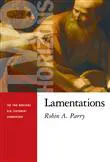

Lamentations
in Two Horizons Old Testament Commentary
Pages
272
Publisher
Eerdmans
Published
1/25/2010
ISBN-13
9780802827142
Traditional scholarly commentaries aspire to open up biblical texts in the light of their ancient social and cultural contexts. In this commentary Robin Parry seeks to take the insights of such works seriously yet also move far beyond them by considering Lamentations within ever-expanding canonical and contemporary contexts. How do the words of Lamentations resonate when read in the context of Jeremiah? Or in the contexts of Isaiah 4055, the New Testament, the history of Christian anti-Semitism, or the suffering of victims today?
The question at the heart of this unusual engagement with the text is How can Lamentations function as Christian scripture? Parry argues that the key to answering this question is to follow the ancient liturgical tradition of the church and to see the text in the light of the death and resurrection of Israels Messiah Jesus. According to Parry, Lamentations is Israels Holy Saturday literature the cries of those caught between the death of Jerusalem and its resurrection. In this context Christians are able to make connections between this anguished Israelite poetry, the sufferings of Jesus, and the sufferings of the world.
These biblical-theological links have the potential to open up fresh and imaginative theological, doxological, and pastoral encounters with a sadly neglected biblical book.
Collections
This book appears in the following featured collections.
- Top Old Testament Commentaries by Engaging Scripture (Nijay Gupta's Substack)
- TGC: Preaching Commentaries by The Gospel Coalition
Reviews
Parry moves expertly between the Old Testament context and the theological significance of the book. He also gives careful attention to connections between the Old Testament text and the New.
[Full Review]
Parry's commentary includes a translation of Lamentations with helpful textual notes. The commentary proper demonstrates literary sensitivity and provides helpful historical context. The real gem, though, is the collection of essays in the second half of the book. These theological essays look at Lamentations in canonical and liturgical context, and, aside from one section in which Parry promotes his universalist theology (an approach I believe to be seriously flawed), are insightful and thought-provoking. Too often commentaries on Lamentations are mere appendices to commentaries on Jeremiah. This volume pushes back against that trend, treating this beautiful book of divine poetry with the attention it deserves.
Commentaries on Lamentations by itself are few. But I thankful that the editors of THOTC decided not to tack Lamentations onto a Jeremiah volume and allow Lamentations to be explored. Parry does a great job with this one. I quite like the Two Horizons approach, especially for books like Lamentations where unpacking issues raised by the text would bog down the exposition or require frequent excursuses. Parry is a great critical thinker, and capable theologian and exegete who, I think, is highly underrated (perhaps because of evangelical aversions to his universalism).

